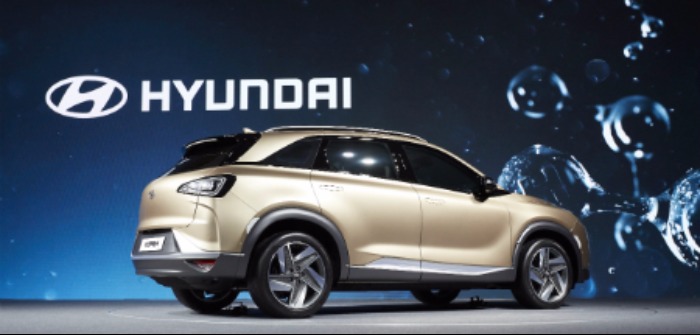Hyundai has offered an early glimpse of its next generation fuel cell vehicle, well ahead of the hydrogen-powered SUV’s official launch early next year. At a special preview event held in Seoul, the near-production-ready version exhibited is said to ’embody Hyundai Motor’s commitment to a new era for advanced eco-friendly vehicle development’.
The new SUV previews Hyundai Motor’s second commercially produced hydrogen model and uses the company’s fourth generation of hydrogen fuel cell technology. The new fuel cell model was said to have been ‘developed on four key pillars that focus on fuel cell system efficiency, performance (maximum output), durability, and tank storage density’.
By enhancing the fuel cell’s performance, reducing hydrogen consumption, and optimizing key components, Hyundai states that the vehicle’s efficiency is improved compared to its predecessor, the ix35 Fuel Cell. The new SUV boasts an efficiency level of 60%, or a 9% increase from the ix35’s 55.3%. With enhanced system efficiency, the new model targets a driving range of 800km on a single charge (based on NEDC standards).
The new model’s maximum output is enhanced by 20% compared to its predecessor, boasting an impressive 163PS of power. The fuel cell SUV also improves the car’s cold start capability, overcoming the challenges of starting fuel cell vehicles in temperatures below freezing point. The vehicle’s architecture is optimized to allow it to be started at -30 degrees Celsius (22 degrees Fahrenheit), by incorporating key components in the fuel stack developed by Hyundai Motor. In addition to boosting the new car’s capabilities, the enhanced components – such as MEA (membrane electrode assembly) and bipolar plates – also helped to reduce production costs.
The next generation hydrogen vehicle makes significant improvements in tank storage density. The tank package now features three equally-sized tanks, as opposed to two of different sizes. World-class tank gravimetric capacity (hydrogen storage mass per tank weight) was achieved through innovations to the plastic liner configuration and efficient layering pattern, which resulted in a reduction of thickness.
The mass-produced new vehicle will also feature advanced driver assistance technologies, alongside its extensive hydrogen-powered range. The details of the new ADAS features will be disclosed in January at the 2018 CES, along with the official model name.
“With exceptional efficiency, serene styling, and uncompromised performance, our next generation fuel cell SUV is the true epitome of an eco-friendly vehicle of the future,” said Lee Ki-sang, senior vice president of Hyundai Motor Group’s Eco Technology Center. “Hyundai Motor will take lead in developing and producing green energy vehicles that would ultimately complement a near-zero emission society.”


